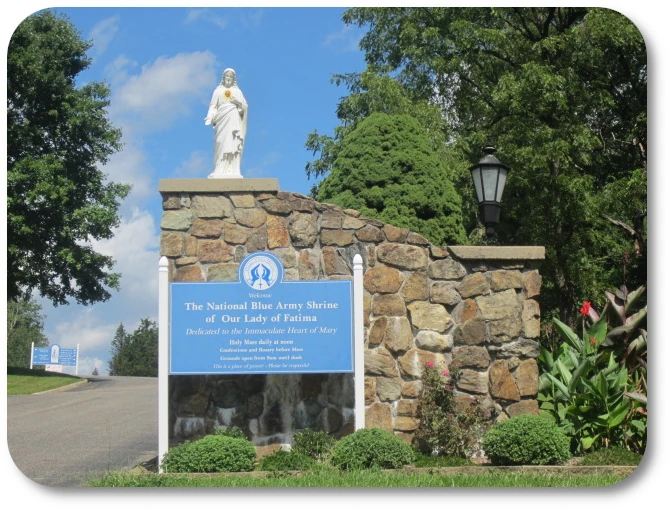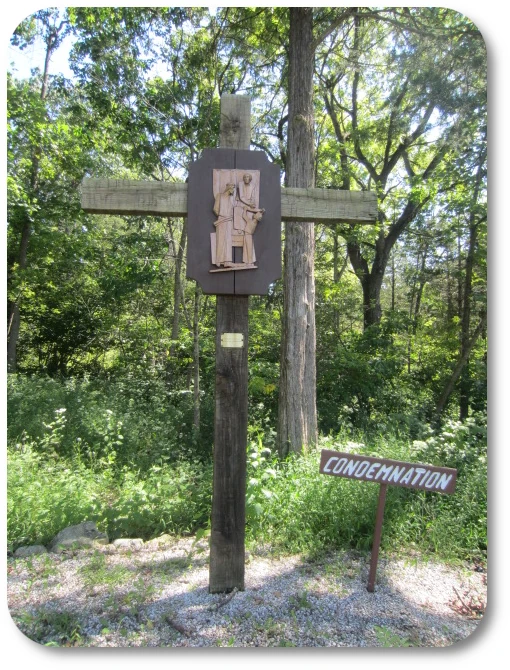- Rosary
- Station Options
- Blue Army All Stations
- Station 1
Blue Army First Station
📍 Blue Army First Station Shrine – Washington, NJ

The path begins here at Blue Army First Station, near the chapel where Mary’s presence is so deeply felt, and the countryside stretches with quiet solemnity.
Even the stillness feels like prayer. Standing at the First Station, it’s hard not to think about the world we live in — how truth is often dismissed, how silence replaces courage, and how quickly the crowd can turn.
Jesus, innocent and radiant with love, stands condemned. No crimes. No guilt. Just quiet dignity in the face of false judgment.
And here, on this peaceful hill in New Jersey, I feel the invitation to stand with Him — not just to observe, but to enter the moment. To see where I, too, am tempted to blend into the crowd. Where I remain quiet when my voice is needed.
It’s not enough to admire Jesus here. The path He walks is asking something of me. It always begins with a choice — to stand for truth, even when it costs something.
Station 1: Jesus is Condemned to Death

🙏 Reflection Prayer
Lord Jesus, You stood silently before Pilate while the world turned against You. Here at this peaceful shrine, where Mary gently calls us to penance and prayer, I bring my own hesitations and silences.
Forgive me for the times I’ve failed to stand for what is right — in my family, at work, in the quiet decisions of daily life. Forgive me when I’ve feared discomfort more than I feared losing You. In this quiet countryside, help me hear Your voice more clearly than the noise of the crowd.
Give me the courage to speak truth, even when it costs something. Let this journey with You begin in honesty and love — not in fear or shame, but in the freedom that comes from walking beside You, step by step.

🏛️ Authority and the Cost of Compromise
Pilate had the authority to stop it all — and he knew Jesus was innocent.
He wasn’t evil. He was conflicted. But power is rarely simple. It comes with fear, expectations, and the ever-present temptation to do what’s easy instead of what’s right.
Here, where Mary calls us to conversion and the salvation of souls, I’m reminded that Pilate’s failure wasn’t dramatic — it was quiet. Subtle. A series of small compromises. I wonder how often I fall into that same pattern. In the name of keeping peace, pleasing others, or avoiding conflict, do I allow injustice to pass by quietly?
He questioned, he delayed, he passed responsibility to others — but in the end, he gave in. He handed over truth for the sake of convenience. That’s what makes this station so unsettling. Not because Pilate is distant from us — but because he looks so much like us.
❓ What Was His Crime?
As I stand near this station, I find myself asking: what exactly was Jesus accused of? Healing too many? Forgiving too freely? Loving the wrong people? The charges feel vague, even absurd — and yet they were enough to sentence Him to death.
Watching this unfold, I start to realize that truth itself will always be uncomfortable in a world built on pride and control. Jesus didn’t break laws — He broke illusions. And that was too much for those in power. They couldn’t accept a love that didn’t serve their systems.
I ask myself quietly:
When do I reject uncomfortable truth, too?
When do I turn away from the voice of Christ because it demands something deeper from me?
“Truth suffers, but never dies.” — St. Teresa of Avila
💙 Mary and the Virtue of Patience
As Jesus stood condemned, Mary remained near — silent, present, and watching. She knew her Son was innocent. She knew the crowd was wrong. And still, she waited. No rescue came. No miracle interrupted the sentence.
This is the patience of a mother who trusts in God even when the world turns upside down. She doesn’t lash out or try to change the outcome. She stays. Here, in this peaceful shrine where Mary appeared as Our Lady of Fatima, I imagine her heart breaking, yet firmly anchored.
She teaches me that patience isn't passive — it's choosing to stay when everything in me wants to run. It’s holding space for God to work, even when I don’t understand. Mary’s stillness is not weakness. It’s strength, rooted in love.
This place — the Blue Army First Station Shrine — is quiet, but it is not still. It carries the invitation to follow, to choose, to stand with Jesus when the world condemns Him again and again in our own time. This first station isn’t just history. It’s a mirror, a beginning, and a call to courage.